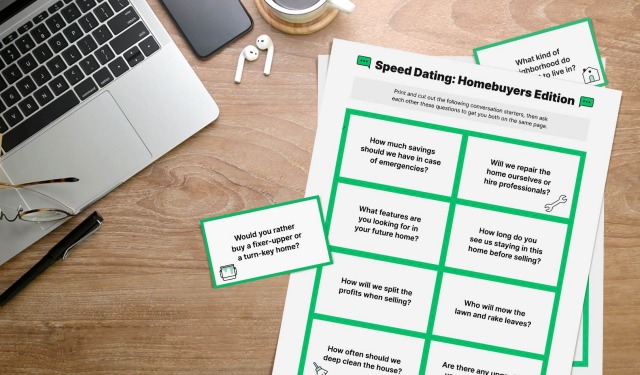As the average wedding cost has risen to almost $30,000, more people than ever are skipping out on saying “I do”. Instead, they are putting this money towards a down payment on a home.
It isn’t just coupled in a romantic relationship buying homes in pairs- it is friends and family as well. In fact, one in four millennials is purchasing a home with a partner. After two years of uncertainty due to COVID, many people have shifted their priorities. Not to mention, home prices are skyrocketing, meaning two incomes to pay a mortgage is better than one.
Real estate is a steady investment that can bring benefits for years to come. If you are considering signing a mortgage with a partner rather than a marriage certificate, we have curated the perfect guide for you.
Six Questions To Ask Before Signing The Mortgage
There are a few crucial questions to ask before you both swiftly sign a mortgage. Whether it be a romantic partner, family member, or longtime friend, there are some items that need to be addressed. Asking the right questions can save you both a lot of headaches down the road.
1. Will both of us be on the mortgage?
While both of you can be on the mortgage if your co-borrower has a lot of debt or a bad credit score it may be best to keep them off the mortgage. This can prevent you from getting the mortgage approved.
If you and your co-borrower have a similar financial history, applying together can be beneficial. Usually, a higher gross income between the pair of you will get you a lower interest rate, as well as a higher loan amount.
2. Who will hold the title to the home?
The title dictates how much of the home you each will own. You can choose one of you to hold the title outright or split it as you please. Consider how much each person is putting in when deciding on how to split the title. Typically, if you’re name is not on the mortgage, your name should not be put on the title.
3. Do we need a property agreement?
A property agreement, also known as a cohabitation agreement, is like a prenup for real estate. You never hope to use it, but it is a necessity. It is a legally binding agreement that dictates the share of finances when paying off the mortgage, utilities, and household expenses. Most of the time, the property agreement will also include who owns the property in the event of a bad breakup.
Property agreements typically include:
- Share of expenses
- Buyout terms
- Exit strategy
- How to handle legal disputes
- Profit-sharing when selling
- Split of ownership and payments
4. Will we be living on the property full time?
The owners of the home will either be considered occupants or non-occupants. Non-occupant mortgages often require a higher credit score, a larger down payment, and pay a higher interest rate. Being a landlord is a lot of work, mortgage lenders realize this and you should as well.
5. What is our financial history?
Before beginning your house hunt, you and your partner need to have a chat about finances. It can be uncomfortable, but you should be open about debt, savings, and student loans. Not knowing each other’s financial history will make the home buying process more stressful.
Consider how much savings you have combined for a down payment and what your credit scores are. This will determine how much you are able to borrow and what your interest rate will be, which can ultimately determine your overall budget.
Common financial questions for unmarried co-buyers include:
- How much savings do I have?
- What is my credit score?
- How much debt or loans do I have?
- What is my debt-to-income ratio?
- What is my annual income?
- How stable has my work history been?
- How much can I afford to put down on a home?
6. Who will get the tax deduction?
When you file taxes separately from your co-buyer, only one of you will be able to count the home as a tax deduction. This is a personal decision between you and your partner. It’s a good idea to consider who makes the most money, whose name is on the mortgage payments, and who takes the biggest financial hit when making this decision.
How To Determine If You Are Compatible Co-Buyers
The work with purchasing a property doesn’t stop when the mortgage is signed. Things like home maintenance and HOA fees are consistent. Understanding each other’s long-term home goals, chore preferences, and savings methods will save you headaches in the long run.
We have curated two printable games to help you determine if you are compatible to co-buy a home with a partner, friend, or family member.
Speed Dating

Chances are, you probably already know your future co-buyer pretty well. If you have never lived with them, there can be some things you don’t know about their living style, preferences, and financial habits.
Here are a few critical questions that need to be asked before signing the mortgage.
- Who will mow the lawn and rake the leaves?
- Do you want to bring pets or kids into the house?
- How often should we deep clean?
- What are your home-buying deal breakers?
- Will we repair the home ourselves?
- What kind of neighborhood do you want to live in?
Get more insight by playing a round of speed dating: homebuyers edition. We have included a printable to make a deck of cards that will spark up a conversation. You can even turn this into a fun game by setting a timer and doing a true “speed” round.
Make a Vision Board

Perhaps the most fun part of the home-owning process is decorating and making changes. It is important that you and your future co-buyer are in agreement about how your perfect home should look and what it should include.
Your future co-buyer could envision a gas stove and you can envision a beautiful garden outback. One of the preferences could be a total deal-breaker which is why it is important to get this out of the way before signing a mortgage.
We have included a dream home printable for you and your future co-buyer to fill out in order to determine each of your wants and needs.
Let’s Talk about Home Insurance
Once the home buying process is under wraps, don’t forget to buy home insurance. It is important to shop around and find the best policy for you. You want to be confident in your home insurance decision.
This commitment is perhaps the second most important behind the commitment to your future co-buyer. In the event something happens to your home, you will rely on home insurance to get through.
Instead of saying yes to the address, say yes to the address. No matter who you choose to co-buy a home with, whether it be a cousin, a best friend, or a significant other, this will be one of the biggest and most special decisions of your life. Be sure to use the tips and tricks above to make the process smooth and easy.
